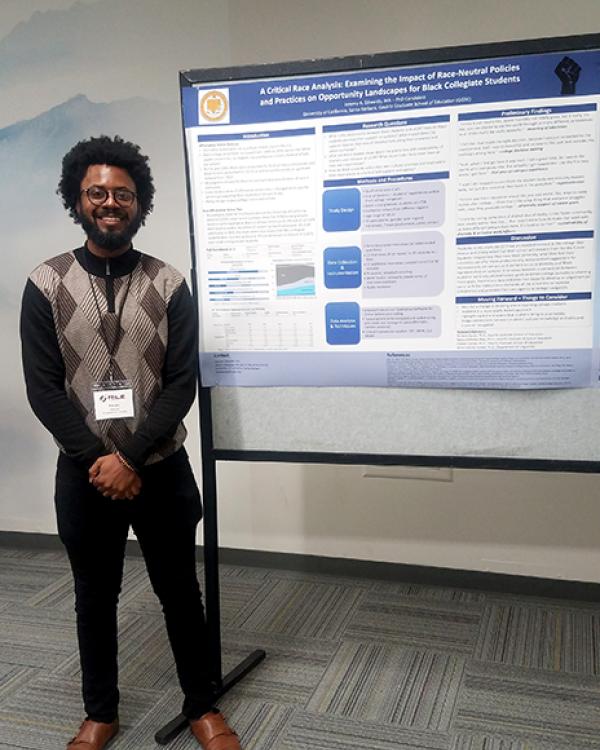
Jeremy Edwards graduated with a Ph.D. with an emphasis in Culture and Development from the Department of Education.
GGSE: What are your research interests, and why are they important to you?
Edwards: My work centers on the Black experience in areas of higher education. Through a critical race lens, my work examines higher education practices and policies that impact Black student experiences. I assess relationships and support systems between Black students and predominantly non-Black universities that ultimately impact agency and decision making toward future career pathways. I focus on exploring different levels of access and opportunity landscapes that often exclude or ignore the histories and experiences of Black-identifying people. This is important as we continue to live in a “colorblind” society that upholds race-neutrality while simultaneously reinforcing historically anti-Black practices through means of employment, housing, healthcare, and education. This work pushes for an increase in Black representation among students, faculty, and staff on these predominantly non-Black campuses, and a campus transformation that encourages Black students to excel and reach their academic and career goals.
GGSE: What’s one piece of information you wish every person knew and remembered about your research?
Edwards: This research is an ongoing project and there’s always more work to be done in this area. I hope that my work contributes to the ongoing fight towards more inclusivity within course curriculum and instruction, university administration and staff units, and campus networks that directly support students on their academic and career pathways. My research will hopefully be remembered for re-structuring the higher education apparatus, challenging policies and practices that add to the erasure of Black students, and creating change for populations that have been historically and strategically excluded in these spaces.
GGSE: Tell us about your dissertation. Why are you proud of it?
Edwards: My dissertation research involves a qualitative case study (N=15) that identifies several layers of concern centered around the Black college student experience. Through two rounds of qualitative semi-structured interviews, my study addresses the concerns of access (e.g., college adjustment and campus support) for Black students at the UC level. My work explores the relationships between Black students and the UC system in thinking about levels of support and advocacy for Black students on recruitment (e.g., why students want to attend a UC), retention (e.g., quality of life at a UC, climate issues, academic demands), and post-graduation career plans (e.g., preliminary thoughts about where students are going). My work also assesses the impact of diversity campaigning on student experiences. My dissertation study provided Black students with a chance to be heard and reflect upon their academic and career journeys thus far. This work could lead to further application of policy and practice changes within the UC-wide system as it pertains to Black enrollment and retention efforts.
GGSE: What’s next? What do you hope to do after earning your Ph.D.?
Edwards: A mini-vacation would be nice (when it’s safe enough to travel). I am in the process of applying for teaching positions at some select colleges. Soon, I plan to apply to post-doctoral positions and assistant professor positions at universities (in departments of Education, Black/Africana Studies, History, or Literature primarily) that involve research but value teaching and student advising as well. I also plan to submit some prior academic work for publication in journals that focus on college access and critical perspectives in higher education. As I move forward in my studies, it is critical to explore areas of food security and health as two basic needs that are highly impacted by the COVID-19 pandemic.
GGSE: What piece of advice would you pass on to future students in the Gevirtz school?
Edwards: Follow your passions. Be curious. Ask questions. Don’t be afraid to take risks. Apply to conferences and submit to journals even when you may doubt yourself or feel you need to wait. Look towards your support networks to get you through your hurdles—family, friends, colleagues, faculty, staff. Be productive, but take breaks too. This journey is a marathon, not a sprint.
GGSE: Is there anyone in the Gevirtz School you would like to thank?
Edwards: I thank my advisor, Dr. Richard Durán, for giving me a chance and believing in me throughout my graduate journey. Thank you to my committee members, Dr. Rebeca Mireles-Rios and Dr. Sharon Conley. Thank you for your continued support. I’m forever indebted. I want to thank Dr. Anne Charity-Hudley for the last three years of guidance. My graduate school experience would not be the same without her teaching me about life during/after graduate school and exemplifying what it means to be a Black faculty member at a research institution. I want to thank the Department of Black Studies for supporting my teaching and research goals. As an employee of the department for five years, they were integral in informing my work and evolving my own level of criticality. Thank you to my family, friends, and anyone who’s supported me on this journey.
GGSE: What is one of your favorite memories of your grad school experience?
Edwards: I was invited to attend and present my Master’s work at the Hawai‘i Educational Research Association (HERA) Conference at the University of Hawai‘i at Mānoa a few years ago. I traveled alone for the first time in a while, met some amazing people, and got to take a short trip to Hawai’i for the first time ever. When the time is right, I will definitely be back!
GGSE: In lieu of an in-person ceremony, how have you celebrated your graduation?
Edwards: Thus far, I’ve celebrated my graduation by speaking with family and friends as I am apart from them currently. I’ve also been periodically taking time to reflect on these past six years, and I look forward to the work ahead. Later this year, I do plan to have an official celebration with loved ones (and a grad photoshoot at some point!).